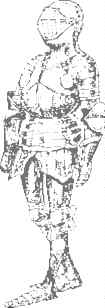Ghosts: a range of belief
In Henry IV, Part One there is a heated argument between Glendower, who believes that he can "call spirits from the vasty deep," and indulges in "deep experiments"; and Hotspur, who regards such talk as "skimble-skamble stuff" (3.1.52, 48,150).
A similar range of beliefs is explored in Hamlet by the skeptical, classically learned Horatio and the superstitious Marcellus. Horatio begins by thinking that the Ghost is a "fantasy" of Barnardo and Marcellus, but is quickly convinced by "the sensible and true avouch/ Of [his] own eyes" that it is "something more than fantasy" (1.1.23-58). He seeks for explanations from his classical background, citing the supernatural events which occurred before Julius Caesar's death (familiar to Shakespeare's audience through his recent play on the subject).
And Marcellus replies. . .
Marcellus, however, is more ready with folk tales--the belief that the cock crows all night on Christmas Eve so that "no spirit dare stir abroad"--which Horatio will only admit to believing "in part" (161, 165). There is thus a range of belief onstage between a degree of skepticism and deep belief in supernatural forces; there would have been at least as wide a range in the audience that watched the play.
Some in Shakespeare's audience would have believed that ghosts, like miracles, had once existed, but were no longer to be found on earth; some would have shared beliefs close to those of Marcellus.
Others may have believed that there were those like Glendower who could communicate with spirits; certainly there were several men in the period who had the reputation of dabbling in occult secrets (whether they were believed to succeed or not). John Dee, astrologer to Queen Elizabeth, was one such well-known figure. The Ghost itself seems to have some Catholic, some Protestant, and some pagan characteristics.
Ian Delaney's "Short
Course on Hamlet" records some Renaissance
discussions of ghosts.
